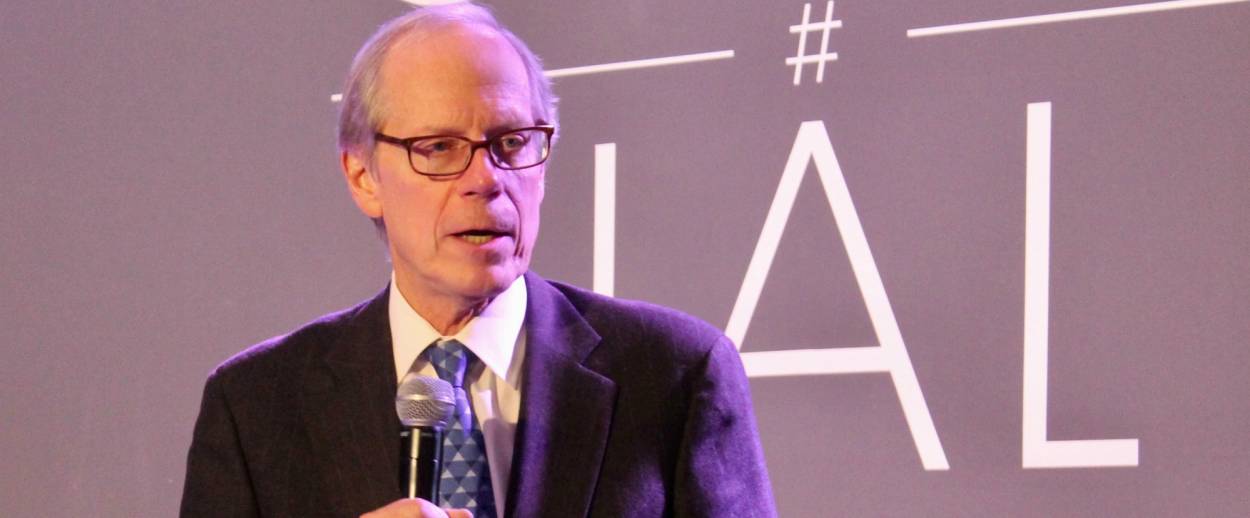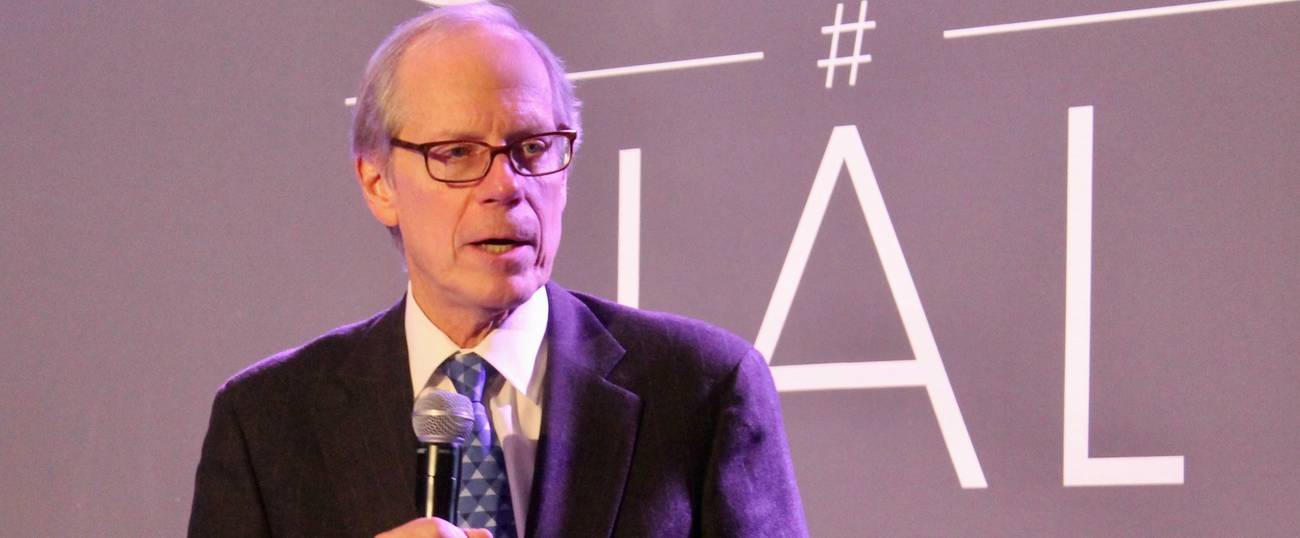Rockefeller Brothers Fund President Explains BDS to His Trustees: It’s About “Justice, Dignity, and Security”
Read Stephen Heintz’s memo to the RBF staff regarding Tablet’s story




On May 24, Tablet published an in-depth story examining the Rockefeller Brothers Fund’s (RBF) Middle East programs. The article explored how and why RBF became one of the most prominent U.S.-based institutional funders of the Boycott, Divestment, and Sanctions movement targeting Israel, and also recounted the fund’s efforts at promoting diplomacy between the U.S. and Iran. Shortly after the article was published, Stephen Heintz, the fund’s president since 2001, sent an email to the organization’s trustees and staff criticizing the story. I have now obtained that email.
The message, sent about 14 hours after the story was published, is a glimpse into the assumptions undergirding RBF’s Israel-related programming. Pro-BDS funding is aimed at “ending the 50-year long occupation in order to bring justice, dignity, and security to all Israelis and Palestinians”—in Heintz’s view, pro-boycott efforts are a valid instrument for ending Israel’s presence in the West Bank, and are therefore in Israel’s long-term good. Even so, Heintz isn’t eager to take credit for everything that RBF’s money helps fund: “The article includes indirect attacks on us and our grantees through guilt by association with several degrees of separation,” he writes, in reference to pro-BDS organizations that have received a total of $880,000 from the Fund, much of it awarded for “general support.”
Heintz makes little attempt to convince the recipients of his letter of the virtue of the Fund’s position. Instead of explaining how funding boycott groups that oppose the two-state solution will, in fact, help to make a fair and just two-state solution possible, he argues that it’s unfair to draw links between RBF and the activities and organizations that RBF actively and publicly funds. In contrast, and as my article demonstrated, RBF’s pro-boycott grantees are not shy about what they stand for.
Immediately after accusing the article of engaging in “guilt by association,” Heintz claims that the story reflects “the well-practiced tactics of very conservative forces that support the policies of Israel’s coalition government which includes political parties that call for the annexation of the entire West Bank.” Apparently, while it is wrong to link Heintz and RBF to the organizations whose work they fund, it is legitimate to imply that journalists who report those facts are somehow aligned with “political parties that call for the annexation of the entire West Bank” — which for the record, I am not, and Tablet is not.
But the most interesting part of the email is about David Rockefeller, the former Chase Bank chairman, RBF co-founder, and family patriarch who died this past March at 101. I could find no evidence that Rockefeller had any knowledge that RBF—to which he planned on donating $225 million after his death—was funding pro-BDS groups. Rockefeller was friends with Henry Kissinger and Anwar Sadat; as president of Chase Bank, he successfully weathered a 1964 Arab League boycott threat leveled over Chase’s role as the U.S. fiscal agent for State of Israel Bonds. In his native New York City, Rockefeller was known as an exponent of inter-communal tolerance and helped mainstream Jews and African Americans into the city’s elite. Rockefeller had raised money for Palestinian refugees and pushed for a more “balanced” U.S. approach to the Israeli-Arab conflict in the late 1960s and early ’70s, but his 2002 memoirs still contained strong evidence that he was sensitive to the perception he was in any way hostile to Israel.
Heintz understands the Fund’s underwriting of BDS to be consistent with their founder’s vision and values. He writes:
The part of the article that hurts me the most is Mr. Rosen’s irresponsible and baseless conjecture about what our founder, David Rockefeller, would think of our work in the Middle East. We are conscientious custodians of David’s legacy and we think he would be proud of our work dedicated to peace and justice in the region. These are the values that we all share and drive every decision we make at the Fund.
Heintz’s email suggests RBF isn’t about to reassess its decision to fund pro-BDS groups like Jewish Voice for Peace and the U.S. Campaign for Palestinian Rights. The BDS movement will be able to count on the moral and monetary support of a widely respected Rockefeller philanthropy: “We are very careful in our decision-making and we are willing to make decisions that we recognize may be controversial but that we know are right,” writes Heintz. “[A]nd that is a position of which I think we can all be proud.”
I reached out to Heintz to ask whether there was anything in the May 25 email that he wouldn’t stand by a month later, as well as to ask him to elaborate on the “degrees of separation” between RBF and the activities of its grantees, as well as on the connection, as he understands it, between the article and pro-annexation political parties in Israel. “I have nothing to add to our lengthy interview of May 12th,” he emailed back.
Here is Heintz’s email to his staff in response to Tablet’s story:
From: Stephen Heintz [Heintz’s email address]
Sent: Thursday, May 25, 2017 11:53 AM
To: RBF Trustees [Trustee email alias]
CC: RBF Staff [Staff email alias]
Subject: Article in the online magazine, the Tablet
Dear Trustees:
We have been in touch with you about an article that was published early this morning in Tablet magazine (click the link to read) focused on the Fund’s Middle East grantmaking. As we expected, it comes from a perspective highly critical of the RBF because of our grants to some organizations that support BDS and economic activism. It is also critical of the RBF’s work to encourage U.S. diplomatic engagement with Iran.
The article reflects what is fundamentally an ideological disagreement with the approach that the RBF and our grantees have taken with regard to ending the fifty-year long occupation in order to bring justice, dignity, and security to all Israelis and Palestinians and our efforts to promote dialogue with Iran as a means of peacefully resolving a major international security threat. The article includes indirect attacks on us and our grantees through guilt by association with several degrees of separation. These are well-practiced tactics of very conservative forces that support the policies of Israel’s coalition government which includes political parties that call for the annexation of the entire West Bank.
The part of the article that hurts me the most is Mr. Rosen’s irresponsible and baseless conjecture about what our founder, David Rockefeller, would think of our work in the Middle East. We are conscientious custodians of David’s legacy and we think he would be proud of our work dedicated to peace and justice in the region. These are the values that we all share and drive every decision we make at the Fund.
Rosen notes that other foundations have given in to pressure on these issues, while the RBF has not. We are very careful in our decision-making and we are willing to make decisions that we recognize may be controversial but that we know are right — and that is a position of which I think we can all be proud. Criticism of the kind in this article is designed to force us to retreat from our support for non-violent efforts to help create a durable peace in a region long plagued by violence and the denial of basic human rights.
All of us on the RBF’s staff are deeply grateful for the board’s support even in the face of controversy. It is the consistency of our values that has made the RBF a leading foundation throughout its history.
Please do not hesitate to contact me with any questions or concerns.
Sincerely,
Stephen Heintz, President
Rockefeller Brothers Fund
Armin Rosen is a staff writer for Tablet Magazine.